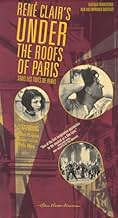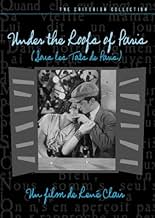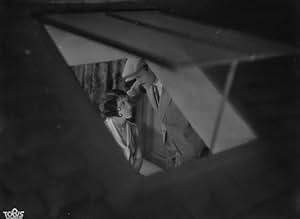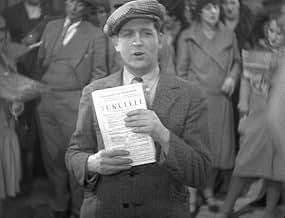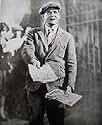VALUTAZIONE IMDb
7,0/10
2611
LA TUA VALUTAZIONE
Aggiungi una trama nella tua linguaAlbert is smitten for Pola but ends up wrongly committed in jail, in the meantime her affections are sought after by his friend, and on his release both love and friendship must be tested.Albert is smitten for Pola but ends up wrongly committed in jail, in the meantime her affections are sought after by his friend, and on his release both love and friendship must be tested.Albert is smitten for Pola but ends up wrongly committed in jail, in the meantime her affections are sought after by his friend, and on his release both love and friendship must be tested.
- Regia
- Sceneggiatura
- Star
- Premi
- 1 vittoria in totale
Edmond T. Gréville
- Louis
- (as Edmond Gréville)
Delphine Abdala
- La buraliste
- (non citato nei titoli originali)
Raymond Aimos
- Un gars du milieu
- (non citato nei titoli originali)
Raymond Blot
- Un membre de la bande à Fred
- (non citato nei titoli originali)
Thomy Bourdelle
- François
- (non citato nei titoli originali)
Léon Courtois
- L'inspecteur
- (non citato nei titoli originali)
Édouard Francomme
- Un membre de la bande à Fred
- (non citato nei titoli originali)
André Michaud
- Un agent
- (non citato nei titoli originali)
Jane Pierson
- La dame du premier
- (non citato nei titoli originali)
Louis Pré Fils
- Le locataire du troisième
- (non citato nei titoli originali)
Eugène Stuber
- Un membre de la bande à Fred
- (non citato nei titoli originali)
Louis Zellas
- Le consommateur jaloux
- (non citato nei titoli originali)
Recensioni in evidenza
The great French film actor Jacques Tati made several films that tried to capture a Paris that disappeared even before World WarII. It was a world best seen through the gifted photography of Atget and Brassai. A world of intimacy, silent streets, virtually no traffic, limited means, but unlimited pleasures. A wonderful opening shot glides across rooftops to join a cluster of ordinary Parisians enjoying a singalong, an odd but compelling precursor of karaoke and rock concerts, but untarnished by special effects or hype. There is a sense that we are witnessing a street version of Lautrec's Moulin Rouge.
The cinematography is extraordinary. It can only be compared to Fritz Lang's "M", or the "Third Man". Very little actually happens and dialogue is used sporadically. Yet we find ourselves caring very much about the people about whom we know so little.
An unforgettable film.
The cinematography is extraordinary. It can only be compared to Fritz Lang's "M", or the "Third Man". Very little actually happens and dialogue is used sporadically. Yet we find ourselves caring very much about the people about whom we know so little.
An unforgettable film.
"Under the Roofs of Paris" is a film written and directed by René Clair. His direction is lovely--with some creative and lovely camera-work. As far as the story goes, it seems a bit thin.
The film begins with Pola being vigorously dated by Fred. In other words, the thug Fred isn't about to take no for an answer--and Pola is naturally creeped out by him. Ultimately, Fred steals her apartment key and Pola is understandably afraid to return home. When she bumps into Albert, he takes pity for her and takes her home. Over time, they fall for each other. However, Albert is arrested (thanks to his friend Emil) and Fred isn't about to allow Albert and Pola to be together. What's to come of them?
Technically, the film is a mixed bag--though I really cannot fault the film for its deficits. Although the film is part sound and part silent, films outside the United States took much longer to shift to all-talking pictures--so I accept that French films still were making the transition. Sound-wise, this 1930 film is very similar to 1927's "The Jazz Singer"--with a few songs and a bit of dialog but otherwise being essentially a silent film. However, what was very advanced was the camera work and the crane shots--they were very impressive and the film sure looked great.
Apart from the technical, the film had a story that seemed a bit weak. There isn't a lot of depth to the characters, they aren't necessarily likable and I didn't feel all that involved with them. So, overall, it is worth seeing but not a must-see--and not as good as some of the director's other efforts.
The film begins with Pola being vigorously dated by Fred. In other words, the thug Fred isn't about to take no for an answer--and Pola is naturally creeped out by him. Ultimately, Fred steals her apartment key and Pola is understandably afraid to return home. When she bumps into Albert, he takes pity for her and takes her home. Over time, they fall for each other. However, Albert is arrested (thanks to his friend Emil) and Fred isn't about to allow Albert and Pola to be together. What's to come of them?
Technically, the film is a mixed bag--though I really cannot fault the film for its deficits. Although the film is part sound and part silent, films outside the United States took much longer to shift to all-talking pictures--so I accept that French films still were making the transition. Sound-wise, this 1930 film is very similar to 1927's "The Jazz Singer"--with a few songs and a bit of dialog but otherwise being essentially a silent film. However, what was very advanced was the camera work and the crane shots--they were very impressive and the film sure looked great.
Apart from the technical, the film had a story that seemed a bit weak. There isn't a lot of depth to the characters, they aren't necessarily likable and I didn't feel all that involved with them. So, overall, it is worth seeing but not a must-see--and not as good as some of the director's other efforts.
The film marvellously shows the nostalgic dream of the old Paris and its common people. With melancholic irony, Clair tells a story of the milieu of backstreets and backyards, of street singers, pickpockets, fiddlers and strange townsmen. Here, his grasp into the present does not become realistic depictions of circumstances, but a poetic romance, for which reality is only one aspect of life.
In this regard, especially the sound has turned out quite well. And how hesitantly Clair used this new technical innovation! His generally critical attitude towards sound in films induced, that "Sous les toits" is mainly composed of silent parts (including many dialog scenes), which are highlighted with music or noises such as trains driving past. The song "Sous Les Toits De Paris" of Albert, the street singer, becomes to the red thread which links several scenes and bridges time distances. A fight taking place in the dark only informs the viewer through noises. For that, we witness a dispute, where the matter is uninteresting and predictable, without any sound - shot through a glass door. One can say sound is especially used for enrichment and left out when it would be needless. Thus, a film came into being that wonderfully combines sentiment, humor and intelligence with languishingly beautiful tunes.
In this regard, especially the sound has turned out quite well. And how hesitantly Clair used this new technical innovation! His generally critical attitude towards sound in films induced, that "Sous les toits" is mainly composed of silent parts (including many dialog scenes), which are highlighted with music or noises such as trains driving past. The song "Sous Les Toits De Paris" of Albert, the street singer, becomes to the red thread which links several scenes and bridges time distances. A fight taking place in the dark only informs the viewer through noises. For that, we witness a dispute, where the matter is uninteresting and predictable, without any sound - shot through a glass door. One can say sound is especially used for enrichment and left out when it would be needless. Thus, a film came into being that wonderfully combines sentiment, humor and intelligence with languishingly beautiful tunes.
--- this film changed my views on b&w, i first saw this when i was a wee lass of 13, awkward and shy, all i had to do with myself was watch late- night t.v. i cried so hard at the end of the film i thought for sure i'd wake my mum, thank god CBC showed it again not long after that, and like the big geek i was, and probably still am, i taped it, i liked the rawness of it, the sound wasn't very good, but it didn't matter, still doesn't, i would love to make a movie that has this same feeling the absolut "realness" i dislike the crud hollywood keeps churning out, but , the fact remains that i live in this time, and am almost forced to swallow the disgraceful porridge that is cinema. it's christmas day, i think i'll go slip on my "under the rooftops of paris" and dream of a time when film still had a heart!!
While singing in a lower class quarter in Paris, the street singer Albert (Albert Préjean) falls in love with the Romanian party girl Pola (Pola Illéry), who is the companion of the gangster Fred (Gaston Modot). One night, Albert meets with Pola, who has just found that Fred had stolen her key, and his friend Louis (Edmond T. Gréville) proposes to toss to date her. However, Albert brings her to his room and they spend the night together, with Albert sleeping on the floor and Pola on his bed. Early in the morning, the pickpocket Émile (Bill Bocket) brings a bag with stolen pieces and asks Albert to keep the bag for him. When the police busts Albert's room and finds the stolen goods, he is arrested and sent to jail. Meanwhile Fred travels and Pola seeks comfort with Louis, and they stay together. When Émile is arrested by the police, he confesses that Albert is innocent and he is released and seeks out Pola. Meanwhile Fred returns to Paris and also seeks out Pola that is with Louis. The three men that are under the spell of the gorgeous lady dispute her love and only one wins.
"Sous les Toits de Paris" is a film with a wonderful transition between silent and sound eras. This is the first René Clair's film that I watched and I found very original and interesting the style of this director that uses the acting of silent movies with gestures and facial expressions and dialogs instead of intertitles, everything supported by the marvelous song "Sous les Toits de Paris" and impressive camera work. The paradox of this delightful film are the low-life characters, composed by pickpocket (Émile); gangster (Fred); a pickpocket that steals the girl of his friend (Louis); and an easy woman (Pola). It is also unusual that the girl does not end the story with the good guy, showing no commercial concern like in most of the Hollywood movies. Not only Albert, Fred and Louis, but I have also been bewitched by the beauty and charm of Pola Illéry. I did not find any information about the death of this actress in Internet. My vote is eight.
Title (Brazil): "Sob os Tetos de Paris" ("Under the Ceilings of Paris")
"Sous les Toits de Paris" is a film with a wonderful transition between silent and sound eras. This is the first René Clair's film that I watched and I found very original and interesting the style of this director that uses the acting of silent movies with gestures and facial expressions and dialogs instead of intertitles, everything supported by the marvelous song "Sous les Toits de Paris" and impressive camera work. The paradox of this delightful film are the low-life characters, composed by pickpocket (Émile); gangster (Fred); a pickpocket that steals the girl of his friend (Louis); and an easy woman (Pola). It is also unusual that the girl does not end the story with the good guy, showing no commercial concern like in most of the Hollywood movies. Not only Albert, Fred and Louis, but I have also been bewitched by the beauty and charm of Pola Illéry. I did not find any information about the death of this actress in Internet. My vote is eight.
Title (Brazil): "Sob os Tetos de Paris" ("Under the Ceilings of Paris")
Lo sapevi?
- QuizThe opening sequence and the street scenes were filmed in a studio.
- Citazioni
Albert, a young street singer: [On seeing Pola bedding down on his bedroom floor] Okay, take the bed, I'll sleep on the floor.
- ConnessioniFeatured in Les dossiers de l'écran: Boulevard du crépuscule (1969)
I più visti
Accedi per valutare e creare un elenco di titoli salvati per ottenere consigli personalizzati
- How long is Under the Roofs of Paris?Powered by Alexa
Dettagli
- Tempo di esecuzione
- 1h 36min(96 min)
- Colore
Contribuisci a questa pagina
Suggerisci una modifica o aggiungi i contenuti mancanti



